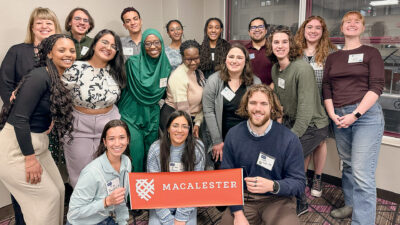
By Victoria Carter / Photo by Wesley Volcy at the Brooklyn Artery
In the midst of the pandemic, many Americans took up an old pastime that was perfect for home isolation: jigsaw puzzles.
They sorted through hundreds or thousands of pieces to assemble scenes of Americana: Landscapes. Windmills. Dogs (so many dogs). Smiling white people. Sailboats. Artwork curated for a narrow section of consumers—specifically, white ones.
Mandi Masden ’08 knows these genres well. Growing up in Cheyenne, Wyoming, Masden was, in her words, “a puzzle boss.” She even had a designated puzzle table in her room. But gradually her hobby faded to the background. After majoring in theater, English, and American studies at Macalester, she earned an MFA in acting at the National Theatre Conservatory in Denver and launched a successful career on stage and screen in New York City. She has acted on Broadway and appeared in popular shows including Law and Order: SVU, Blue Bloods, and Madam Secretary, as well as commercials for Snickers and U.S. Bank.
By the time she worked on a performance piece in 2019 that drew on puzzles structurally and metaphorically, her enthusiasm surprised a friend who had never heard her talk about puzzles. She came to a sudden realization.
“I hadn’t done a puzzle in a long time because I hadn’t seen anything that I’d wanted to do.”
Later that year, Masden’s friend set out to find her a puzzle that she would actually want to do, with a subject that had something to do with who she is—a Black woman. Such a puzzle was surprisingly hard to find. He eventually ordered a custom puzzle, using a painting by Atlanta-based artist Charly Palmer as the subject—a piece of art Masden loved so much that she had tried to buy it earlier in the year but couldn’t afford the price.
She started imagining a line of puzzles that showcased contemporary artists of color, allowing puzzle enthusiasts to engage with fine art in an accessible and affordable way—and addressing the gap in accessibility to collecting fine art that blocks people from participating in art culture. And to Masden, the underrepresentation of people of color in puzzles was connected to the lack of diversity in fine art as a whole. As her idea took shape, she learned from a Macalester Today article on Professor Brianna Heggeseth’s paper “Assessing Diversity in Major US Art Museums” that at the eighteen museums in Heggeseth’s research team’s study, roughly 85 percent of the artists whose work is shown are white.
Inspired, Masden incorporated as Apostrophe Puzzles—an apostrophe symbolizing both omission (the lack of diversity in puzzles) and possession (the art by and for people of color featured in Apostrophe’s collection of puzzles). She invited several artists of color to partner with her, and found a puzzle manufacturer.
Then the pandemic hit.
With all film, television, and theater production shut down, Masden suddenly lost the income she had planned to rely on while she launched her puzzle business.
Instead, she launched a crowdfunding campaign. Masden set hers up on IFundWomen with an initial goal of $10,000 in thirty days—a target she reached in only five days, largely through the support of Mac students and alumni who helped the campaign ultimately raise $40,000.
She describes that Mac community as “passionate about things like social justice and equity and inclusion.” As one of few Black students on a campus where people pride themselves on a progressive culture, Masden was under no illusion the school was devoid of racism or prejudice. But “it felt like Macalester was a place that wasn’t afraid to have the conversation,” she says. “I was also learning, in those classrooms, about racism, power structure, and history. It was definitely an education in understanding who I am, what my politics are, and where they fit. A lot of the most important Black teachers I’ve had in my life, I had at that school.”
That unapologetic confidence and determination was an asset in the early days of Apostrophe—and once the pandemic began, with so much of the population sheltering in place, the puzzle market was surging. But the boom worked against Apostrophe Puzzles: the manufacturer she had planned to work with, along with every other US-based puzzle manufacturer she spoke to, didn’t have room to make her puzzles.
“Even when I lost the manufacturer I was like, ‘Okay, that’s a closed door, I’ll find an open one.’” Rather than allowing a seemingly huge obstacle to derail the dream, Masden took it in stride. Through networking with existing puzzle makers whose offerings she admired, she was able to secure a new overseas manufacturer.
Masden doesn’t regard this setback as the hardest part of getting Apostrophe off the ground. It was learning to trust that she was up to the challenge of starting this company without a background in business or puzzles. What she did have was a belief in her own intellect, ability to learn on her feet, and tireless work ethic—and with that she knew she could go far.
“Once I allowed myself to believe in myself—everything else felt manageable,” she says.
Today Apostrophe Puzzles are available online and in bookstores, brick and mortar boutiques, and museums, and Masden launched a second collection earlier in 2022. In her bid to expand representation of people of color in the art world, Masden has shown that jigsaw puzzles and fine art are a perfect fit.
Victoria Carter is a writer based in northern California. Her writing focuses on the intersections of race and just about anything else.
April 21 2022
Back to top





